Mail voting: Mike Pence, aides embrace practice panned by Donald Trump
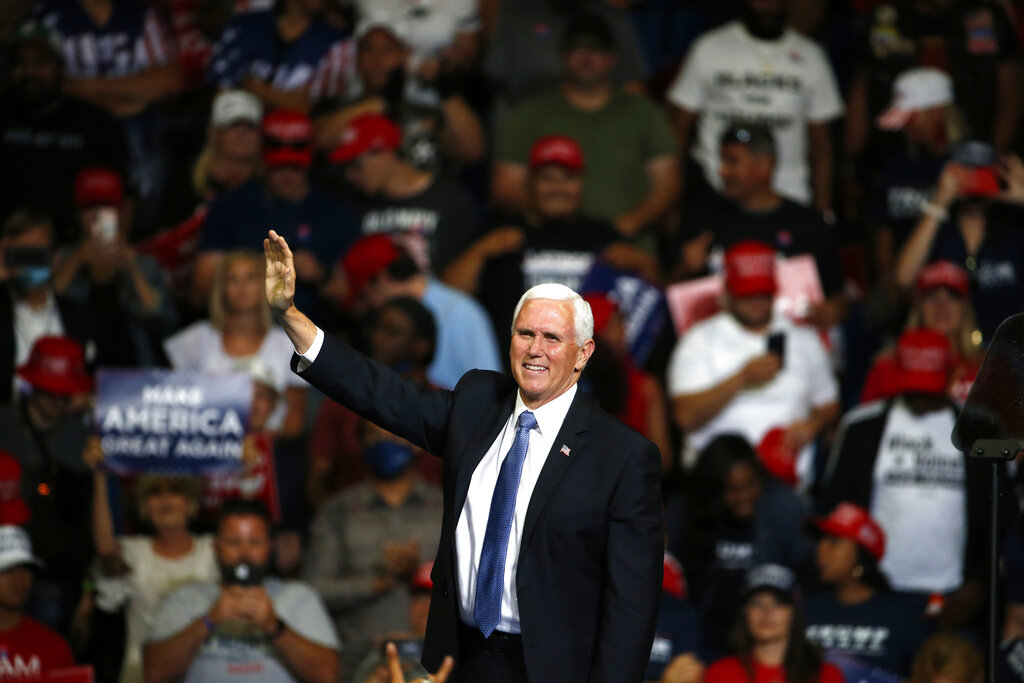
More than three years after leaving the Indiana governor’s residence, Mike Pence still lists that as his official residence and votes absentee accordingly.
Joe Biden pivots focus to Donald Trump amid coronavirus concerns

The new coronavirus has upended the presidential campaign at a crucial moment.
GOP shows little desire for witnesses ahead of critical vote
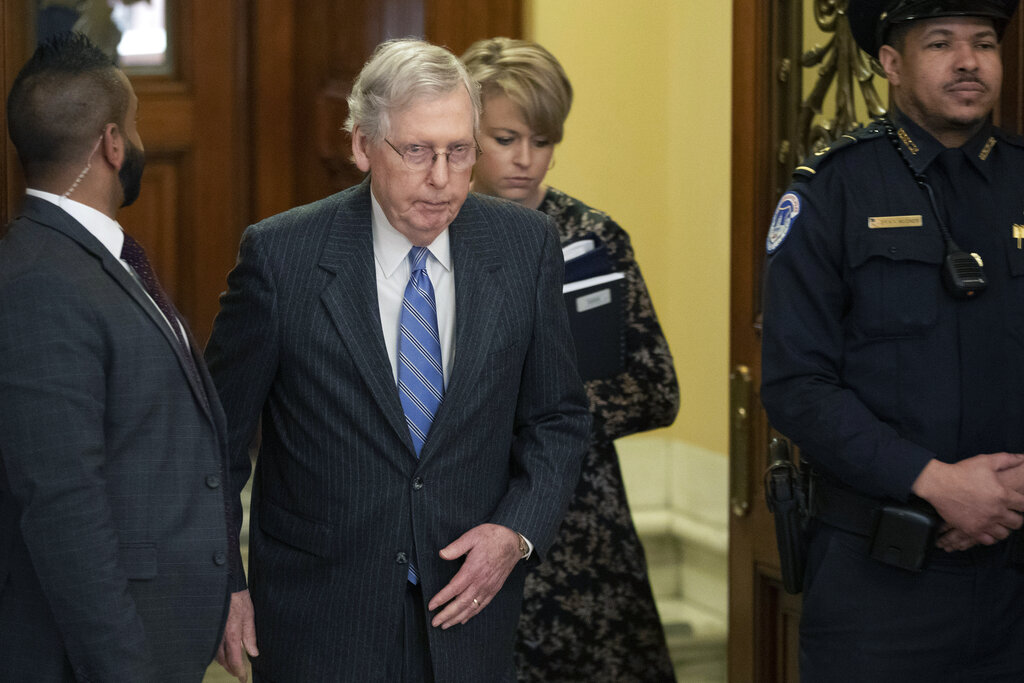
“We have heard plenty,” according to the Senate’s No. 3 Republican.
Dems say oust Donald Trump or he’ll do it again; ‘he is who he is’
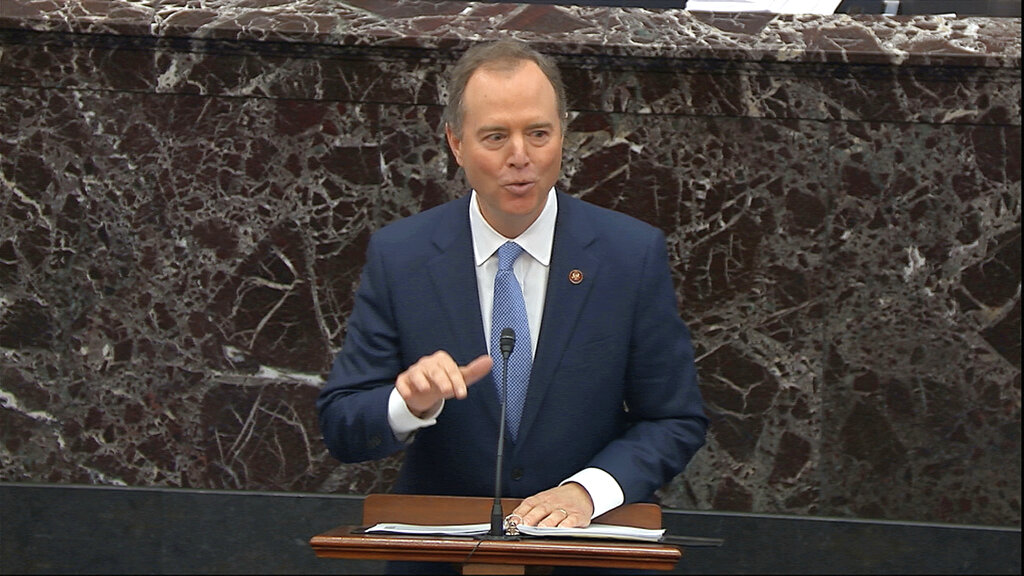
“You cannot leave a man like that in office.” – Adam Schiff
Donald Trump conservative critics launch PAC to fight reelection

A small group of President Donald Trump’s fiercest conservative critics, including the husband of the president’s own chief adviser, is launching a super PAC designed to fight Trump’s reelection and punish congressional Republicans deemed his “enablers.” The new organization, known as the Lincoln Project, represents a formal step forward for the so-called Never Trump movement, which has been limited largely to social media commentary and cable news attacks through the first three years of Trump’s presidency. Organizers report fundraising commitments exceeding $1 million to begin, although they hope to raise and spend much more to fund a months-long advertising campaign in a handful of 2020 battleground states to persuade disaffected Republican voters to break from Trump’s GOP. The mission, as outlined in a website that launched Tuesday coinciding with a New York Times opinion piece, is simple: “Defeat President Trump and Trumpism at the ballot box.” The group is led by a seven-person advisory council that features some of the GOP’s most vocal Trump critics. Most, but not all, have already left the Republican Party to protest Trump’s rise. The principals include former John McCain adviser Steve Schmidt, former Ohio Gov. John Kasich adviser John Weaver, former New Hampshire GOP chair Jennifer Horn, veteran Republican operative Rick Wilson and George Conway, a conservative attorney and husband of Trump’s chief counselor Kellyanne Conway. In an interview, George Conway said that he encouraged the new super PAC to involve Anonymous, an unnamed Trump administration official who authored a recent book warning the public against Trump’s reelection. The rest of the group ultimately decided not to take Conway’s suggestion. “I think the more the merrier,” George Conway told The Associated Press. “And I hope maybe he — he or she, I don’t know who Anonymous is — will come out someday and join the effort. Because everyone who believes as we do that Donald Trump is a cancer on the presidency and on the Constitution needs to help and join this effort.” The inception of the Lincoln Project is significant, but to say it represents a minority of Trump’s Republican Party would be an understatement. Roughly 9 in 10 Republican voters approved of the president’s job performance and have all year, according to Gallup. And with very few exceptions, Trump has the public backing of virtually every Republican member of Congress. Yet recent elections suggest that Trump’s party is losing ground with educated voters and women, particularly in America’s suburbs, which have traditionally leaned Republican. This new group hopes to push those voters further toward the Democrats. It is very much a work in progress, despite Tuesday’s official launch. While the core players don’t yet have titles, day-to-day operations will be led by Horn and Reed Galen, a veteran Republican operative who worked for McCain but left the GOP after Trump’s nomination in 2016. The group begins as a super PAC, which means it can raise and spend unlimited sums of money and must disclose its donors. “You’re seeing a shift from talk into action,” said Galen, describing the launch as “a big turning point for the political season and for the president’s reelection.” Specifically, the group plans to focus on blocking Trump’s reelection and defeating Trump-allied Senate candidates in a handful of key 2020 battlegrounds. To do so, it’s targeting a narrow but important slice of the electorate: disaffected Republicans and Republican-leaning independents. While there is no concrete road map, Weaver said the organizers plan to fight the president’s reelection in Michigan, Pennsylvania and Wisconsin along with Arizona and North Carolina. Their Senate efforts likely would focus on Arizona, Colorado, North Carolina, Maine and possibly Kansas and Kentucky. Weaver said the group is already reviewing scripts for new ads, which are expected to begin running early next year. “This is organic, and we’re going to be flexible,” he said. “We have to go out and prove ourselves and prove that we can be efficient and effective.” Meanwhile, George Conway, who formally left the GOP last year, said he likely would serve in a “cheerleader” capacity for the new organization because of his limited political experience. “I’m not a fundraiser or political consultant, but if I could help in that way and learn how to do that — even to raise a nickel or two — I’ll do it because it’s important,” he said. “For this, I think I can make an exception.” He suggested the Lincoln Project would pay particular attention to Congress’ impeachment proceedings. “If he’s not removed by the Senate, he needs to be removed at the ballot box,” he said of Trump. “The people in Congress who are enabling him, either actively or passively, they, too, are violating their oaths of office. … And they need to be removed, too.” Catch up on the 2020 election campaign with AP experts on our weekly politics podcast, “Ground Game.” By Steve Peoples AP National Politics Writer Republished with the Permission of the Associated Press.
Donald Trump, 2020 Democrat contenders tout efforts to boost veterans
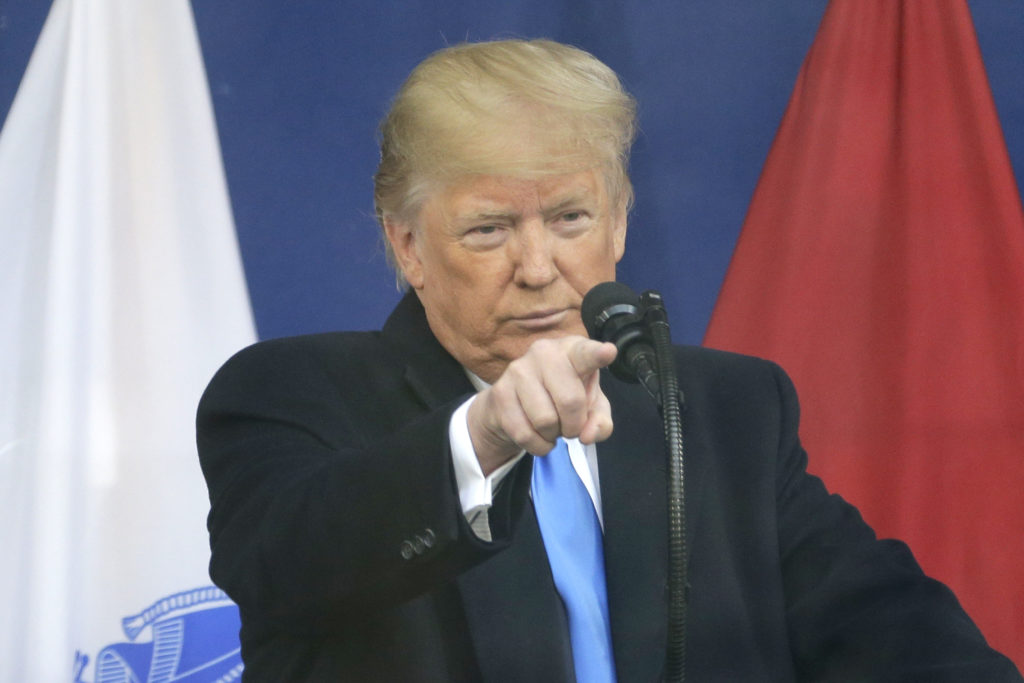
On Veterans Day, President Donald Trump paid tribute to America’s troops at a New York City parade as top 2020 Democratic candidates outlined their plans for the Department of Veterans Affairs, such as naming a woman to run the agency for the first time. The Democratic proposals, coming two days before historic impeachment hearings, sought to highlight policy differences with the embattled president before a key bloc of voters.“The president has let veterans down,” said Democrat Pete Buttigieg, the 37-year-old mayor of South Bend, Indiana. A former Navy intelligence officer, Buttigieg said female veterans and service members in particular have been neglected, including on concerns about sexual harassment and women’s health. Women are the military’s fastest-growing subgroup. “I think leadership plays a huge role so absolutely I’d seek to name a woman to lead VA,” he said. Trump was the first sitting president to attend New York’s veterans parade, viewing veterans as standing among his biggest supporters. Past presidents have typically spent Veterans Day at Arlington National Cemetery for a ceremonial wreath laying. Trump praised the strength of the U.S. military and the death of Islamic State leader Abu Bakr al-Baghdadi, saying the nation’s veterans “risked everything for us. Now it is our duty to serve and protect them every single day of our lives.” More than 100 protesters booed, some holding black balloons that read “support our troops, impeach.” In a liberal city where Trump is deeply unpopular in spite of his roots there, a nearby building’s soaring windows were adorned with signs reading “IMPEACH” and “CONVICT.” Veterans overall have strongly backed Trump throughout his presidency, though views vary widely by party, gender and age, according to AP VoteCast, a survey of 2018 midterm voters. In particular, younger veterans and women generally were more skeptical of Trump, who received multiple draft deferments to avoid going to Vietnam. Former Vice President Joe Biden, whose late son Beau spent a year in Iraq with the Army, stressed that he would “restore trust” in VA. Taking aim at Trump’s stalled progress in reducing suicide among veterans, Biden pledged to hire more VA staff to cut down office wait times for vets at risk of suicide to zero as well as continuing the efforts of the Obama-Biden administration to stem homelessness. About 20 veterans die by suicide each day, a rate basically unchanged during the Trump administration. Trump earlier this year directed a Cabinet-level task force to develop a broader roadmap for veterans’ suicide prevention, due out next spring. “Our veterans deserve leaders who will fight for them as ardently and as forcefully as they have fought for us,” Biden wrote in a Veterans Day statement with his wife, Jill. In a jab at Trump, Vermont Sen. Bernie Sanders released a video highlighting his role in working with the late Republican Sen. John McCain, a decorated war hero, to pass legislation that included the Veterans Choice program in 2014. Trump routinely takes credit for being the first to enact the Choice program. What he actually got done was an expansion of the program achieved by McCain and Sanders, a former chairman of the Senate Veterans Affairs Committee. Speaking at an event focused on seniors and veterans in Des Moines, Iowa, Sanders pledged to combat efforts to privatize the VA and assured a questioner that he would end the “very ugly practice” of deporting military veterans who are not U.S. citizens. “How cruel is it that when people put their lives on the line to protect us,” they are deported, he said. As president, Sanders promised he would build upon his past legislative efforts by making it easier for veterans to get into the VA system. He joins Buttigieg and Massachusetts Sen. Elizabeth Warren in urging increases in doctor pay to attract top VA candidates and fill 49,000 VA positions that have sat vacant as the Trump administration promoted private health care options. During a Veterans Day speech in Rochester, New Hampshire, Buttigieg reflected on his own military path, while taking some digs at Trump. “Having seen the outrage of Americans willing to put their lives on the line for this country having their careers threatened by a president who avoided his own chance to serve, yes, we are going to end the transgender military ban right away,” Buttigieg said. He added later in the speech that the VA needs to be depoliticized. “We’re going to have five-year terms for key positions so that decisions are made based on what is best for veterans and not based on whoever last spoke to the president during a golf game or made the right campaign contribution,” Buttigieg said. During a campaign stop in southeast Iowa, Biden noted that he carries with him every day the totals of those who have died as a consequence of wars in Iraq and Afghanistan. As of Monday, he told about 200 people at a private college in Oskaloosa, the total had reached 6,900. “Every single one of those fallen angels leave a broken community behind,” he said. Tens of thousands more, however, have returned home with post-traumatic stress disorder, Biden said. “They are in trouble and they deserve every single thing we can give them,” he said. Yen reported from Washington. Associated Press writers Alexandra Jaffe in Des Moines, Iowa, Tom Beaumont in Oskaloosa, Iowa, and Zeke Miller in New York contributed to this report. By Hope Yen and Hunter Woodall Associated Press. Republished with the permission of the Associated Press.
APNewsBreak: Pete Buttigieg hopes to name 1st female VA secretary
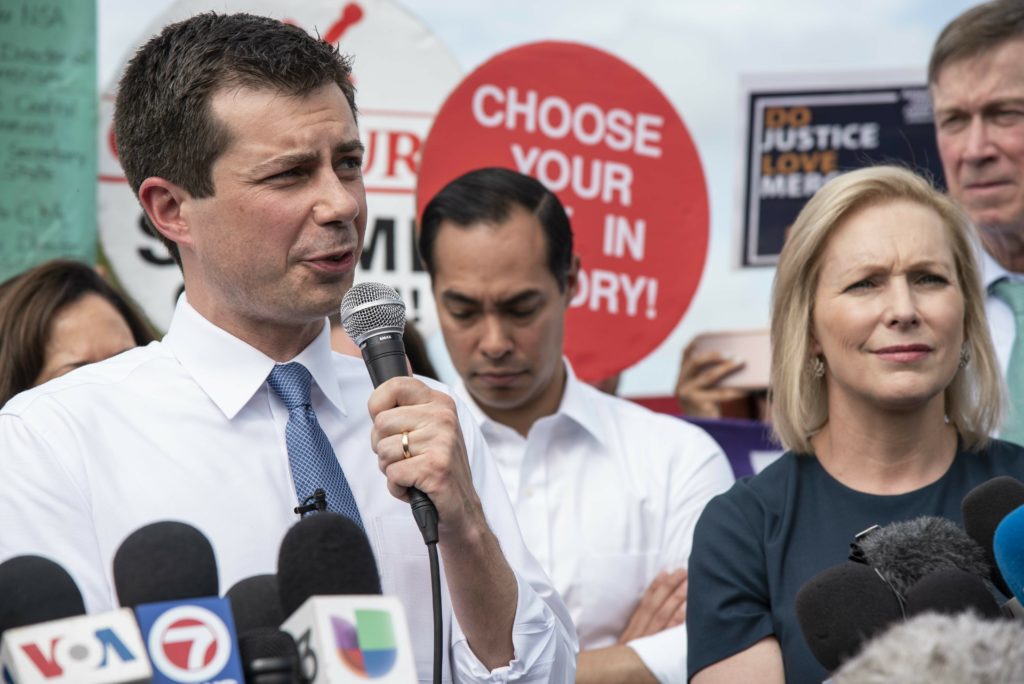
Democratic presidential candidate Pete Buttigieg says if elected he’d like to name a woman to lead the Department of Veterans Affairs for the first time as 2020 hopefuls take aim at President Donald Trump’s record on stemming military suicide and helping female vets. On Veterans Day, several candidates rolled out proposals to meet the needs of America’s 20 million former service members. Buttigieg, the 37-year-old mayor of South Bend, Indiana, said female veterans and service members have been neglected, including on concerns about sexual harassment and women’s health. Women are the military’s fastest-growing subgroup. “I think leadership plays a huge role so absolutely I’d seek to name a woman to lead VA,” Buttigieg, a former Navy intelligence officer, said in an interview with The Associated Press. His comments went a step beyond his 21-page wide-ranging plan released on Monday.“The president has let veterans down,” Buttigieg said. Of the Cabinet and Cabinet-level roles, four have never been held by a woman: Veterans Affairs, Defense, Treasury and White House chief of staff. Buttigieg says he’d take a close look at appointing a female defense secretary as well. Former Vice President Joe Biden’s campaign said he would seek to build on current gains for vets that were started under the Obama-Biden administration, such as stemming homelessness and improving mental health care. “Joe has a long record of support for veterans and our military families,” press secretary Jamal Brown said. “Bringing down the high rate of suicide among our military and veterans will be a top priority for a Biden administration.” In a dig at Trump, Vermont Sen. Bernie Sanders released a video on Monday highlighting his role in working with the late Republican Sen. John McCain, a decorated war hero, to pass legislation that included the Veterans Choice program in 2014. Trump routinely takes credit for being the first to enact the Choice program, ignoring the fact that it was signed into law by President Barack Obama. What Trump got done was an expansion of the program achieved by McCain and Sanders. That expanded program, one of Trump’s signature accomplishments, seeks to steer more veterans over the next decade to private-sector doctors outside the VA. Sanders, a former chairman of the Senate Veterans Affairs Committee who voted against Trump’s plan, says the expanded program goes too far in its investments in the private sector, rather than core VA health care , which many veterans view as better suited to treat battlefield injuries such as post-traumatic stress disorder. Sanders joins Buttigieg and Massachusetts Sen. Elizabeth Warren in urging increases in doctor pay to attract top VA candidates and fill 49,000 VA positions that have sat vacant as the Trump administration promoted private health care options. Sanders said he would fill those vacancies in his first year as president and provide at least $62 billion in new funding to repair and modernize VA facilities to provide cutting-edge care. “We will not dismantle or privatize the VA. We will expand and improve the VA,” Sanders said Monday. Buttigieg told the AP that he would look at rolling back some of the Trump administration’s rules expanding Choice. All the Democratic candidates who have articulated veterans’ plans call for added funding and training for suicide prevention. Buttigieg specifically proposes a new 24/7 VA “concierge” service aimed at guiding at-risk vets into mental health care. Currently, about 20 veterans die by suicide each day, a rate basically unchanged during the Trump administration. Trump earlier this year directed a Cabinet-level task force to develop a broader roadmap for veterans’ suicide prevention, due out next spring. Buttigieg, like Warren, would seek to improve responses to sexual assault in the military by shifting prosecution from military commanders to independent prosecutors. He also wants to put particular focus on stemming homelessness among women vets, many of whom may have experienced sexual trauma. He pointed to his seven-month deployment in Afghanistan in 2014 and watching the impact a female general had “culturally” on the NATO-led International Security Assistance Force. “When a leadership body is more gender diverse, it makes better decisions. So I would absolutely be looking at that,” Buttigieg told the AP. He’s previously pledged to appoint women to at least 50 percent of his Cabinet positions. While veterans overall have strongly backed Trump throughout his presidency, views vary widely by party, gender and age, according to AP VoteCast, a survey of 2018 midterm voters. In particular, younger veterans and women generally were more skeptical of Trump, who received multiple draft deferments to avoid going to Vietnam. A study released by the VA earlier this year found 1 in 4 women veterans using VA health care reported inappropriate comments by male veterans on VA grounds, raising concerns they may delay or miss their treatments. The VA also has rebuffed efforts by Iraq and Afghanistan Veterans of America and other groups to change the VA motto, which some vets believe is outdated and excludes women. That motto refers to the VA’s mission to fulfill a promise of President Abraham Lincoln “to care for him who shall have borne the battle, and for his widow, and his orphan.” Buttigieg said he would direct his VA secretary to change that motto to “fairly represent the diversity of service members and veterans.” Currently, about 10 percent of the nation’s veterans are female. In the U.S. military forces, about 17 percent of those enlisted are women, up from about 2 percent in 1973. By Hope Yen Associated Press HOPE YEN. Republished with the permission of the Associated Press.
White House insists fundamentals of U.S. economy ‘very strong’
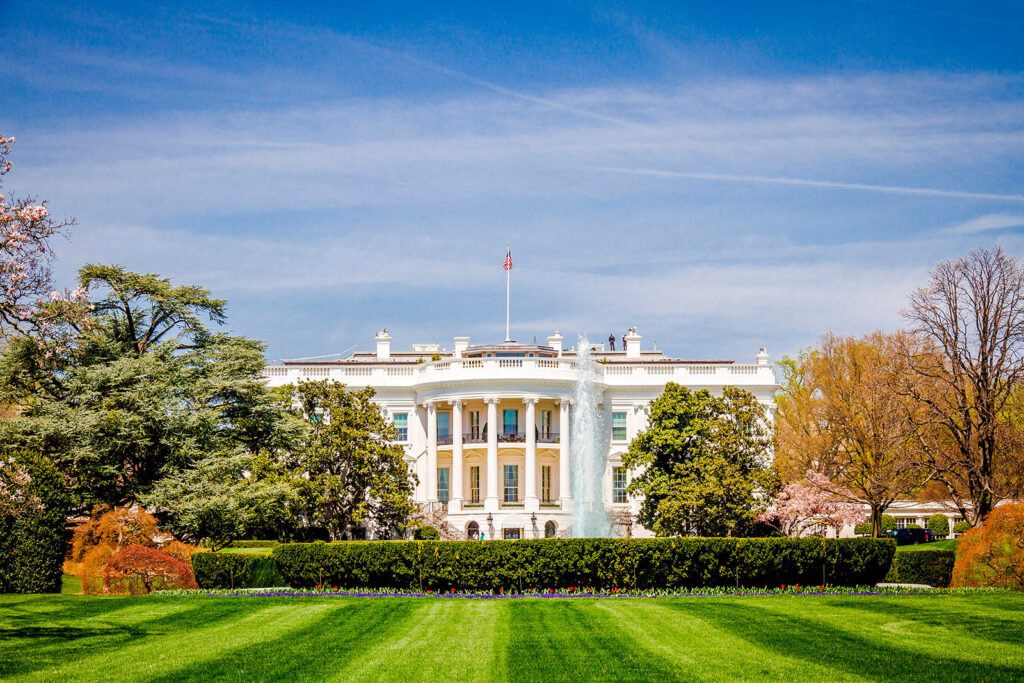
The “fundamentals” of the U.S. economy are solid, the White House asserted, invoking an ill-fated political declaration of a decade ago amid mounting concern that a recession could imperil President Donald Trump’s reelection. Exhibiting no such concern, senior adviser Kellyanne Conway declared to reporters on Monday, “The fact is, the fundamentals of our economy are very strong.” It’s a phrase with a history. Republican John McCain was accused of being out of touch when he made a similar declaration during the 2008 presidential campaign just hours before investment bank Lehman Brothers filed for bankruptcy, setting off a stock market crash and global financial decline. A case can be made for the White House position. The U.S. job market is setting records for low unemployment, and the economy has continued uninterrupted growth since Trump took office. But growth is slowing, stock markets have swung wildly in recent weeks on recession fears, and indicators in the housing and manufacturing sectors have given economists pause. A new survey Monday showed a big majority of economists expecting a downturn to hit by 2021 at the latest, according to a report from the National Association of Business Economics. Trump begs to disagree. “We’re doing tremendously well. Our consumers are rich. I gave a tremendous tax cut and they’re loaded up with money,” Trump said on Sunday. “I don’t think we’re having a recession.” Still, the Republican president took to Twitter on Monday to urge the Federal Reserve to stimulate the economy by cutting interest rates and returning to “quantitative easing” of its monetary policy, an indication of deep anxiety beneath his administration’s bravado. And he backtracked last week on taking the next step in escalating in his trade war with China, concerned that new tariffs on consumer goods could hamper the critical holiday shopping season. White House aides and campaign advisers have been monitoring the recent turbulence in the financial markets and troubling indicators at home and around the world with concern for Trump’s 2020 chances. Any administration has to walk a fine line between reflecting the realities of the global financial situation and adopting its historical role as a cheerleader for the American economy. For Trump, striking that balance may be even more difficult than for most. For decades, economic performance has proven to be a critical component of presidential job approval, and no American leader so much as Trump has tied his political fortunes to it. The celebrity businessman was elected in 2016 promising to reduce unemployment — a task at which he has succeeded — and to bring about historic GDP growth, where he has had less success. The situation today isn’t nearly as dire as in September 2008, when the U.S. and the world were heading into the Great Recession. There are no waves of home foreclosures, no spike in layoffs, no market meltdowns and no government rescues to save powerful banks and financial companies in order to contain the damage. What does exist is a heightened sense of risk about the economy’s path amid slowing global growth and the volatility caused by the trade dispute between the United States and China. There are other reasons as well for the administration’s rosy pronouncements, said Tony Fratto, a former Treasury Department spokesman in the Bush administration during the onset of the financial crisis. He said he sympathized with the Trump administration for having to choose between answering “honestly or responsibly” or otherwise about the state of the economy, noting that any hint of concern “could be self-fulfilling.” “So much of the story of the economy is how people feel about it,” said Lanhee Chen, a Hoover Institution fellow and former economic adviser to 2012 GOP nominee Mitt Romney. “And that’s an inherently a difficult thing to measure.” Highlighting a disconnect between the nation’s broad economic indicators and the “personal economies” of voters in swing states is a priority for Democratic candidates and outside groups heading into 2020. Trump’s advisers acknowledge there are few tools at his disposal to avert a slowdown or recession if one materializes: Internal concerns over a ballooning federal deficit, in part due to the president’s 2017 tax law, are stifling talk of stimulus spending, and skepticism abounds over the chances of passing anything through a polarized Congress ahead of the election. But that hasn’t stopped the White House from exploring ways to make the political cost less painful. Seeking to get ahead of a potential slowdown, Trump has been casting blame on the Federal Reserve, China and now Democrats, claiming political foes are “trying to ‘will’ the Economy to be bad for purposes of the 2020 Election.” If the Federal Reserve would reduce rates and loosen its grip on the money supply “over a fairly short period of time,” he tweeted, “our Economy would be even better, and the World Economy would be greatly and quickly enhanced – good for everyone!” Those actions he’s talking about are the sort a central bank would traditionally take to deal with or try to stave off a slowdown or full-blown recession. Strong fundamentals? A lot depends on which ones the administration highlights or ignores in public comments. Conway and other Trump aides have accurately described the rising retail sales and the solid labor market with its 3.7 percent unemployment rate as sources of strength. Yet factory output and home sales are declining, while business investment has been restricted because of uncertainties from Trump ratcheting up the China trade tension. Even if the economy avoids a recession, economists still expect growth to weaken.Federal Reserve officials estimate that the gross domestic product will slow to roughly 2 percent this year, down from 2.5 percent last year. During his presidential campaign, Trump had boasted he would achieve long-term growth of 4 percent, 5 percent or more. By Zeke Miller and Josh Boak Associated Press AP Business Writer Marcy Gordon contributed. Republished with the permission of the Associated Press.
Deviating from John McCain, Sen. Lindsey Graham goes all in on Team Trump
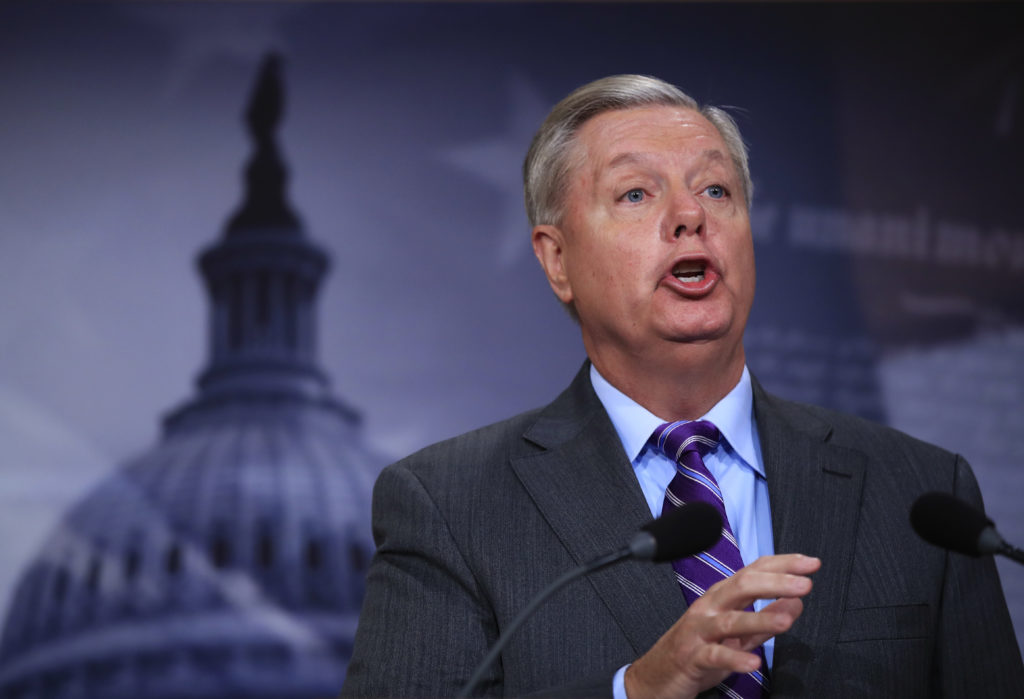
By the end, Sen. John McCain had rejected President Donald Trump. The president was so infuriated by McCain he put a biting reference to the dying Republican senator in his stump speech. Yet one man in Washington still had hope for bridging the gap between the two. “I regret that he didn’t have more time with President Trump,” Republican Sen. Lindsey Graham told The Associated Press this week about McCain, his late friend and mentor. Graham noted McCain was able to forgive his captors during the Vietnam War. “Who knows what would have happened over time.” Graham’s unexplained optimism, his eager attempts to soften Trump’s rough edges, have confused colleagues and caused double-takes across Washington recently. The South Carolina Republican was McCain’s best friend in the Senate, a self-described student of his politics and personal integrity. But he has deviated dramatically in his approach to the tempestuous and divisive president. While others stayed their distance — McCain perhaps most of all — Graham has gone all in, transforming himself into liaison, translator and, critics say, enabler of the president. When establishment Republicans recently nodded knowingly at an anonymous editorial criticizing Trump’s run of the White House, Graham was on Fox calling it a left-wing strategy to show Trump as “crazy” and echoed the president’s unproven charge that the Russia probe “is falling apart.” The senator explains the shift from Never Trump to Team Trump largely in terms of responsibility. In an interview with the AP, Graham said McCain, who lost two bids for the White House, taught him that the country must move forward after elections. That means “you have an obligation” to help the president, especially a fellow Republican, he said. Graham says he’s warmed to the president and suggests he’s using that relationship to shape decisions — though he does not cite specifics. “And I’ve tried to be helpful where I could because I think he needs all the help he can get,” Graham said. “You can be a better critic when people understand that you’re trying to help them be successful.” Graham has his own political motivations. His pivot comes as he is gearing up for his own re-election in 2020. The senator is popular in his deeply conservative state, but opposition to the president could mean risking a primary challenge. “There’s no doubt in my mind that the people of South Carolina, not just Republicans and independents, want to give this country a chance,” Graham said. “The president won the state decisively. He’s very popular among Republicans, and people want him to succeed.” Graham is hardly alone in facing a choice about how best to navigate the politics of the Trump era. Some GOP lawmakers, like Sen. Jeff Flake and Sen. Bob Corker, have openly criticized Trump, to their own political detriment. Both are retiring. Others have been unabashed advocates of the president. Then there are the former presidential rivals, Kentucky Sen. Rand Paul, Florida Sen. Marco Rubio — and now Graham — who have cozied up to Trump despite their campaign trail criticism, giving them a calling card to try to influence policy. Like his mentor, McCain, Graham is the rare senator on Capitol Hill who likes to be in the mix on many issues, brokering deals with his quick wit and biting humor whether he’s the expert or not. Trump seems to agree. Graham has settled into the role of Trump whisperer, golfing regularly with the president and talking with him by phone. Graham’s sphere of influence seems broad. When journalist Bob Woodward wanted to interview the president, he asked Graham to relay the message. When Trump wanted to vent about Woodward’s work, and leaks about a “resistance” within his administration, he talked to Graham about it. “He’s pissed off, he feels betrayed, and I don’t blame him,” Graham said. Particularly in the national security realm, Graham, a defense hawk, provides an alternative to Trump’s noninterventionist streak. In that way, Graham is upholding McCain’s approach and countering another Trump whisperer, the libertarian-leaning senator Paul. Because of Graham’s relationship with Trump, the political world was jolted last month when he said the president may dismiss Attorney General Jeff Sessions after the election. It seemed as if Graham had inside knowledge of the decision, and it was an about-face from just last year, when Graham said Trump would have “holy hell to pay” if he fired Sessions. There was a time when the Trump-Graham nexus of golf outings and White House lunches was inconceivable. Shortly after Trump launched his presidential bid in mid-2015, Graham called him a “jackass” who “shouldn’t be commander-in-chief” for making disparaging remarks about McCain. Campaigning in Graham’s home state a day later, Trump opened a rally by calling Graham a “lightweight” and “idiot” before reading out the senator’s private cellphone number to the delight and disbelief of the crowd. Graham ultimately abandoned his own presidential campaign and, along with McCain, opted not to attend the 2016 GOP convention. He said he wouldn’t back either Trump or Democratic presidential nominee Hillary Clinton in the general election, saying the Republican Party had been “conned.” Graham acknowledged in the interview that Trump can “run hot” and “be a handful” at times. But he also says Trump listens and is more inquisitive than he gets credit for. “Over time, through golf, I’ve actually gotten to know the person,” Graham said, calling Trump both “charming and gracious.” Bob McAlister, a longtime South Carolina political communications strategist who has worked with Graham for decades, said Graham’s approach to Trump reflects the senator’s long-held beliefs about the consequences of elections, including McCain’s 2008 loss to Barack Obama. “Lindsey’s message back then was, ‘Elections have consequences,’ and the Democrats cheered,” McAlister said. “Today, Lindsey says, ‘Elections have consequences,’ and they try to cut his head off.” Brian Katulis, a senior fellow at the liberal Center for American Progress, says Graham has become “chameleon-like” as he courts Trump, trying to influence the president’s thinking while getting little to show for
Donald Trump fumes over NYT op-ed; top officials swiftly deny role
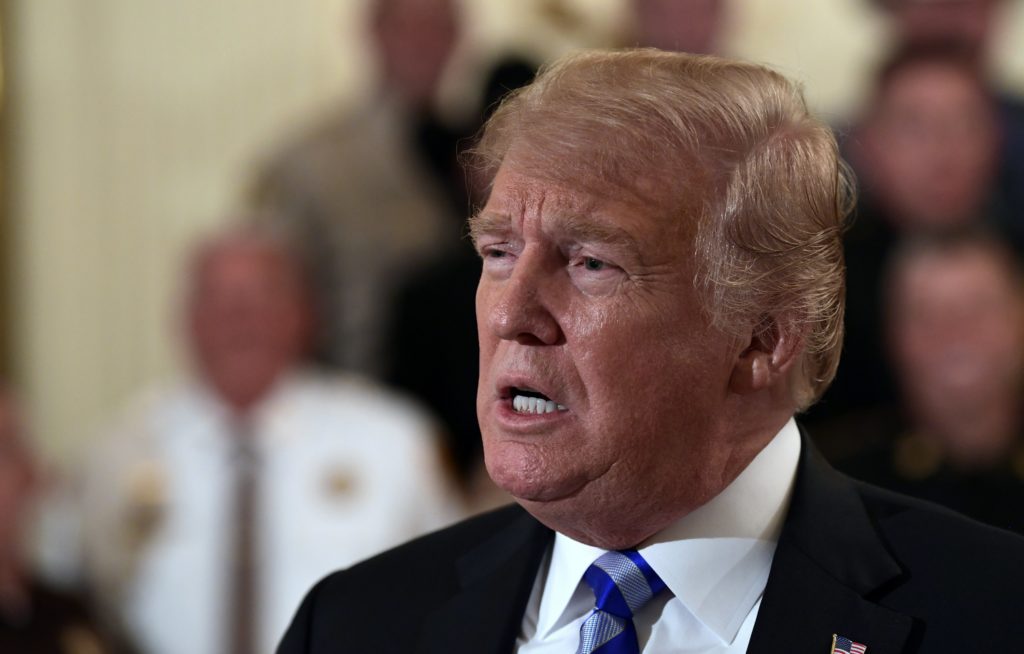
Pushing back against explosive reports his own administration is conspiring against him, President Donald Trump lashed out against the anonymous senior official who wrote a New York Times opinion piece claiming to be part of a “resistance” working “from within” to thwart his most dangerous impulses. Perhaps as striking as the essay was the recognition of the long list of administration officials who plausibly could have been its author. Many have privately shared some of the same concerns expressed about the president with colleagues, friends and reporters. Washington was consumed by a wild guessing game as to the identity of the writer, and swift denials of involvement in the op-ed came Thursday from top administration officials, including from Vice President Mike Pence’s office, Secretary of State Mike Pompeo and Dan Coats, director of national intelligence, and other Cabinet members. Trump was furious, tweeting Thursday morning that “The Deep State and the Left, and their vehicle, the Fake News Media, are going Crazy – & they don’t know what to do.” The Deep State and the Left, and their vehicle, the Fake News Media, are going Crazy – & they don’t know what to do. The Economy is booming like never before, Jobs are at Historic Highs, soon TWO Supreme Court Justices & maybe Declassification to find Additional Corruption. Wow! — Donald J. Trump (@realDonaldTrump) September 6, 2018 On Wednesday night, Trump tweeted a demand that if “the GUTLESS anonymous person does indeed exist, the Times must, for National Security purposes, turn him/her over to government at once!” White House press secretary Sarah Huckabee Sanders called on the “coward” who wrote the piece to “do the right thing and resign.” White House officials did not immediately respond to a request to elaborate on Trump’s call for the writer to be turned over to the government or the unsupported national security ground of his demand. To some observers, the ultimatum appeared to play into the very concerns about the president’s impulses raised by the essay’s author. Trump has demanded that aides identify the leaker, according to two people familiar with the matter, though it was unclear how they might go about doing so. The two were not authorized to speak publicly and spoke on the condition of anonymity. In a “House of Cards”-style plot twist in an already over-the-top administration, Trump allies and political insiders scrambled to unmask the writer. But the op-ed also brought to light questions that have been whispered in Washington for more than a year: Is Trump truly in charge? And could a divided executive branch pose a danger to the country? Former CIA Director John Brennan, a fierce Trump critic, called the op-ed “active insubordination … born out of loyalty to the country.” “This is not sustainable to have an executive branch where individuals are not following the orders of the chief executive,” Brennan told NBC’s “Today” show. “I do think things will get worse before they get better. I don’t know how Donald Trump is going to react to this. A wounded lion is a very dangerous animal, and I think Donald Trump is wounded.” The anonymous author, claiming to be part of the “resistance” to Trump “working diligently from within” his administration, said, “Many Trump appointees have vowed to do what we can to preserve our democratic institutions while thwarting Mr. Trump’s more misguided impulses until he is out of office.” “It may be cold comfort in this chaotic era, but Americans should know that there are adults in the room,” the author continued. “We fully recognize what is happening. And we are trying to do what’s right even when Donald Trump won’t.” Trump raged about the piece in the White House, calling around to confidants to vent about the disloyalty of the author and fuming that the so-called Deep State within the federal government had conspired against him, according to a person familiar with the president’s views but not authorized to discuss them publicly. The text of the op-ed was pulled apart for clues: The writer is identified as an “administration official”; does that mean a person who works outside the White House? The references to Russia and the late Sen. John McCain — do they suggest someone working in national security? Does the writing style sound like someone who worked at a think tank? In a tweet, the Times used the pronoun “he” to refer to the writer; does that rule out all women? The newspaper later said the tweet referring to “he” had been “drafted by someone who is not aware of the author’s identity, including the gender, so the use of ‘he’ was an error.” The Beltway guessing game seeped into the White House, as current and former staffers alike traded calls and texts trying to figure out who could have written the piece, some turning to reporters and asking them for clues. For many in Trump’s orbit, it was stunning to realize just how many people could have been the op-ed’s author. And some of the most senior members of the Trump administration were forced to deny they were the author of the attack on their boss. Hotly debated on Twitter was the author’s use of the word “lodestar,” which pops up frequently in speeches by Pence. Could the anonymous figure be someone in Pence’s orbit? Others argued that the word “lodestar” could have been included to throw people off. In a rare step, Pence’s communications director Jarrod Agen tweeted early Thursday that “The Vice President puts his name on his Op-Eds. The @nytimes should be ashamed and so should the person who wrote the false, illogical, and gutless op-ed. Our office is above such amateur acts.” Pompeo, who was in India, denied writing the anonymous opinion piece, saying, “It’s not mine.” He accused the media of trying to undermine the Trump administration and said he found that “incredibly disturbing.” Coats later issued his own denial, followed by Housing Secretary Ben Carson, Treasury Secretary Steve Mnuchin, budget director Mick
Former Arizona U.S. Sen. Jon Kyl to replace John McCain
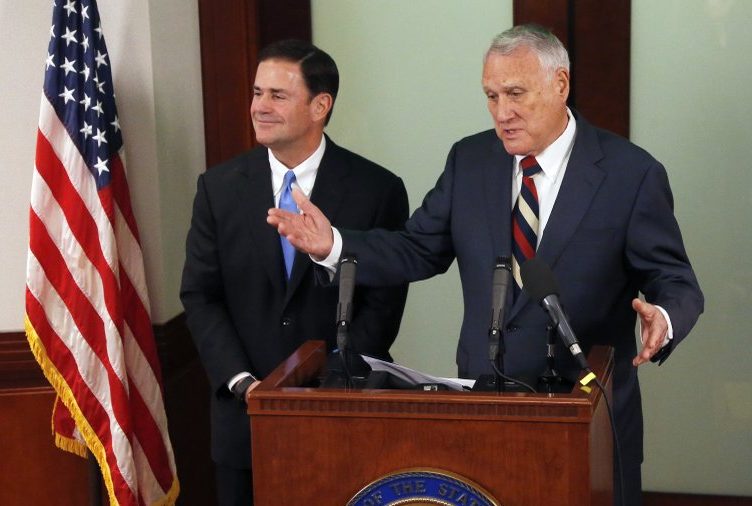
Prolonging the uncertainty over who will fill the late John McCain’s U.S. Senate seat, the governor of Arizona on Tuesday announced the appointment of former Sen. Jon Kyl but said he has only committed to serve until the end of the year. Kyl, a Republican who retired from the Senate in 2012 to spend more time with his family, is currently shepherding Trump’s nomination of Brett Kavanaugh to the U.S. Supreme Court. Kyl’s appointment will make it possible for him to vote for the nomination. But it’s unclear what more Kyl, 76, will do in Washington. He said he agreed to serve briefly out of a “sense of duty” and will not run for the seat in 2020, when Arizona voters will decide who fills the seat through 2022. The seat will then be up again for a full six-year term. Gov. Doug Ducey, also a Republican, said Kyl was “the best possible person, regardless of politics” for the job, and he hopes Kyl serves past the end of the year. If Kyl does leave the Senate after the end of the current congressional term next Jan. 3, Arizona’s governor can appoint another senator for the remaining year. By state law the senator will have to be a member of the same party as the departing one, in this case the GOP. For now, Kyl will pad Republicans’ margin in the narrowly divided Senate. They hold a 51-49 majority but that dwindled to a single vote while McCain stayed in Arizona for much of this year being treated for the brain cancer that killed him on Aug. 25. The GOP is hoping Kyl will be a more reliable partisan vote than McCain, whose opposition to a partial repeal of President Obama’s health care law pitched the party into turmoil last year. Kyl is well-respected in Arizona and has been able to avoid many of the battles with activists that complicated McCain’s career and that of the state’s other senator, Jeff Flake, who is retiring because his feud with Trump made his re-election impossible. Kyl’s entire career in Washington overlapped with McCain’s, and he served with the state’s senior senator for three terms before stepping down. Kyl carved out a profile as a reliable conservative vote and a foreign policy expert. McCain’s widow, Cindy, tweeted: “Jon Kyl is a dear friend of mine and John’s. It’s a great tribute to John that he is prepared to go back into public service to help the state of Arizona.” Doug Cole, a veteran Republican consultant and former McCain aide, said Kyl was a good, safe pick. “I think McCain would be very happy with the pick. Honors his legacy while putting some major horsepower for Arizona in the seat, at least for now,” he said. An attorney, Kyl speaks in a formal, reserved manner that is a sharp contrast to President Trump, and he belongs to an older, less populist vanguard of the GOP. At a news conference where he was introduced as McCain’s replacement, Kyl said in a response to a question that he’s only met Trump once, though he noted he is working for the White House by serving as Kavanaugh’s so-called “sherpa.” With a nod toward McCain, Kyl said the president’s “desire to jump into the middle of or be in the middle of a fight — and by the way that reminds me of somebody — can be detrimental in the end to what he’s trying to achieve.” The unusual timing of Kyl’s appointment could work out for another Arizona Republican who wants to become a U.S. senator — Rep. Martha McSally. She’s currently locked in a tough campaign against Democratic Rep. Kyrsten Sinema for the Senate seat Flake is vacating. Should she lose, McSally — a former Air Force colonel who once worked on Kyl’s staff — could be appointed to the McCain seat if Kyl vacates it in January. Filling McCain’s seat marks a turning point in Arizona political history. The seat has been held by two men who were heralded as giants of the Senate: McCain took the seat once held by Sen. Barry Goldwater after McCain had served in the House of Representatives. The choice of Kyl will also have political consequences for Ducey. He’s up for re-election this November against Democratic challenger David Garcia. For Republican voters who are on the fence about Ducey, a choice they dislike could cause them to withdraw their support for the incumbent or stay home on Election Day. Republished with the permission of the Associated Press.
GOP slows efforts to rename Senate building for John McCain
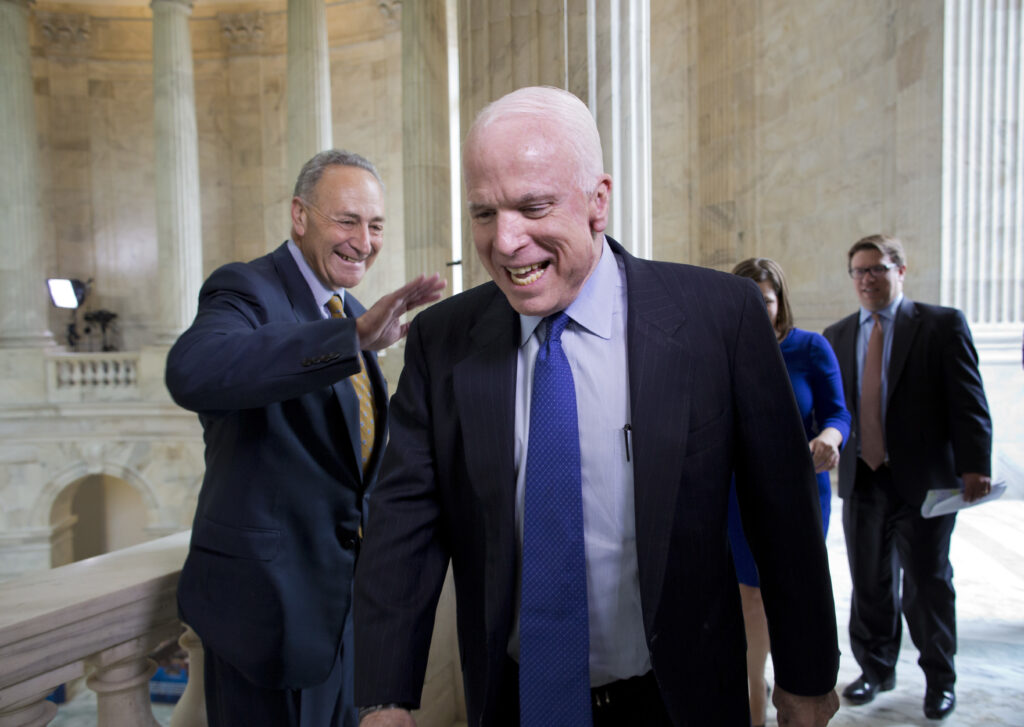
A proposal to rename the Senate’s oldest office building for John McCain has received bipartisan support, but the effort appeared to slow Tuesday as Senate Majority Leader Mitch McConnell announced he will form a bipartisan panel to solicit ideas on the best way to honor the late Arizona senator. McCain “meant so much to so many of us,” inside the Senate and out, McConnell said, adding: “The Senate is eager to work on concrete ways to continue this momentum and provide a lasting tribute to this American hero long after this week’s observances are complete.” Besides the proposal to rename the Russell Senate Office building, lawmakers may consider naming a committee room used by the Senate Armed Services Committee after McCain, who was the panel’s chairman, McConnell said. Another idea is to add McCain’s portrait to a reception room right off the Senate floor, joining such giants as Henry Clay, Daniel Webster and Robert Taft. Only seven senators are honored with portraits there. McConnell was careful not to make a specific recommendation. Senate Democratic leader Chuck Schumer had proposed renaming the Russell Senate Office building in McCain’s honor after the veteran Republican senator died Saturday from brain cancer. The 109-year-old building is named after Sen. Richard Russell, a Georgia Democrat who, like McCain, chaired the Armed Services Committee. Russell, who died in 1971, was a segregationist and led Southern opposition to anti-lynching bills and other civil rights legislation, including the 1964 Civil Rights Act. Previously known simply as the Senate Office Building, it was renamed in Russell’s honor the year after his death. While some Republicans are receptive to renaming the building, many urged caution. Republican Sen. Chuck Grassley of Iowa, who served with McCain for 31 years, said Monday he was in favor of “naming almost any building” for McCain, but added, “I’m not sure that I would make a decision on a specific building at this point.” Republican Sen. Jeff Flake of Arizona, who co-sponsored the measure, said he does “not want to get out ahead” before he talks to McCain’s family. “There are a number of proposals coming forward about ways to honor John McCain. I think this would be a particularly good one, but I want to make sure the family is OK with it,” Flake said. Georgia’s GOP Sen. David Perdue, whose own office was formerly used by Russell, said he’s unsure if residents back home would accept a name change for the building. “This is Washington. There’s going to be 50 percent for something and 50 percent against something,” Perdue said Tuesday. The Senate should spend time finding “the right way” to memorialize McCain’s service, Perdue said. “To knee jerk, to do anything — any suggestion — right now is premature,” he said. Republicans backed McConnell’s plan to study the issue, with some saying McCain himself would appreciate the GOP leader’s commitment to “regular order,” including the process of committee work. McCain “didn’t want ideas cooked up in some back room and sprung on the Senate,” said Sen. John Cornyn of Texas, the No. 2 Republican senator. Republican Sen. Lamar Alexander of Tennessee said that McCain deserves “a significant memorial” in the nation’s capital but that senators have time to decide what the best memorial is. Fellow Tennessee Republican Sen. Bob Corker said he was “all for” renaming the building in McCain’s honor but that “there’ll probably be some discussion about that” in both parties. “Russell is somebody that’s obviously a huge figure, but it is an era that’s gone by. We’re in a new era now,” Corker said Monday. “Who would want to vote against naming a building after somebody who just passed away?” Corker asked, before answering his own question. “There may be some curmudgeon that wouldn’t want to do that.” The proposal to rename the building drew resistance from some Southern senators. “You know Richard Russell was … from the South, and I’m sure not perfect like George Washington and everybody else in his days, but he was a well-respected senator,” said Republican Sen. Richard Shelby of Alabama. The idea is something “we have to think about,” he added. Sen Bill Cassidy, R-La., said he’d “rather find another way” than rename the Russell building. “I think Russell being named Russell is that generation of senators’ message to future generations,” Cassidy said. “What I don’t want is to establish a precedent so something named after John McCain is named after somebody else in the future.” Russell served in the Senate from 1933 until his death and was known as a “senator’s senator” because of his mastery of Senate rules. An ardent defender of the defense budget, Russell also was author of the School Lunch Act, which provides free and low-cost meals in public schools. Schumer, who worked closely with McCain on immigration and other issues, called McCain one of the “few truly great people” he’s met in public service. “His dedication to his country and the military were unsurpassed, and maybe most of all, he was a truth teller — never afraid to speak truth to power in an era where that has become all too rare,” Schumer said. Schumer called Russell “a towering figure in the Senate of his day” but an avowed opponent of civil rights and racial equality. “It is time we recognize that as the times change, so do our heroes,” Schumer said. The renaming proposal would not need approval from the House or from President Donald Trump, a longtime McCain nemesis. Republished with permission from the Associated Press.

